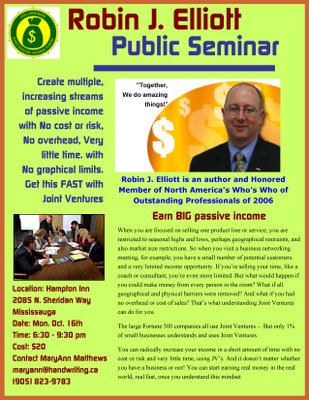Thursday, October 12, 2006
Five Good Joint Venture Questions to Ask
 You learn more by asking than by telling. And you get more done. Not everybody will be a good JV partner.
You learn more by asking than by telling. And you get more done. Not everybody will be a good JV partner.There are a few questions you can ask that will make it easier to set up a JV. Before you do, though, here is a word of advice: You can only make money with people who make money. By that, I mean people who are struggling financially are not good JV partner choices. They often whine about costs, look for excuses not to pay and can be very mercenary, even dishonest. Desperate people do desperate things. Seek successful people to partner with.
Also, remember that you’re not looking for a sales job. As a Joint Venture Broker, you will simply link supply and demand and get paid on all, ongoing, resulting business.
ASK:
1. “What do you want for your business, more than anything else, and, on a scale of one to ten, how badly do you want it?” (Anything less than 10, walk away.)
2. “What do I need to deliver to you in order for you to write me a check for $2,000 every month?”
3. “What commission will you pay me on gross sales that I generate for you?”
4. “What marketing materials, sales aids, and marketing help can you provide me with?” (Get them to pay for expenses if you can, including trade show booths, DVD’s, CD’s, advertising, reports, samples, consultations, seminars, books, etc.)
5. “What tracking systems do you already have in place?”
And if you’re really smart, you will work with fellow Members of the DollarMakers Joint Venture Forum – we have over 450 of them around the world, just waiting for you!
Robin J. Elliott www.DollarMakers.com
Great Fund Raiser for your Charity, Church, Non Profit, or Club
Here’s a nice, easy, no cost, no risk fundraiser for you.
My book, Joint Adventures, sells for $15 as a download from my website, http://www.dollarmakers.com/. We sell a lot of them.
Now you can sell it from your website, ezine, newsletter, or anywhere else, and KEEP ALL THE MONEY.
Three Simple Joint Venture Examples
 Here are three simple Joint Ventures that anyone can do.
Here are three simple Joint Ventures that anyone can do.ONE: There are five competing tire and lube shops on the same street. (Or any other retailer.) They all charge about the same, all give the same 10% discount, offer the same “excellent service”, etc. No real differentiation. Lots of competition. You approach one of them and offer them a way to differentiate themselves from their competition at no extra risk or cost and attract more business – a larger share of the pie. You can translate boring discounts into exciting “Gifts” – the value of the gift is commensurate with the value of the discount. In other words, if someone buys a product for $100, his or her discount would normally be $10. Instead, they get to pick a “gift” valued at $10 for a range of five exciting, nicely packaged gifts. If they buy for $200, they get to pick from a range of “$20 Gifts”, etc. Place a large sign outside: “Your Choice of FREE GIFT with Every Single Purchase!”
You go out and buy the gifts for $10 and package them with specially printed wrapping paper with the business’s logo on it, and sell it to the business for $20. They give away the $20 gift instead of a $20 discount. If you’re really smart, you’ll sell it to them for $18, so they save $2! You still make $8 profit every time. They have to keep some inventory of gifts on hand, and you make money on every gift, every time someone makes a purchase in the shop! If there are 20 transactions a day in the shop, you make money 20 times a day!
You can do this with many different stores/ retailers/ businesses. 20 businesses with 20 purchases per day each = 400 sales per day, and you make money on every one. $10 profit per gift = $4,000 per day in your pocket. Plus, the store makes more money (saving on the discounts and getting more customers!) People would generally prefer a gift to a discount, as long as they have a choice. Here’s the thing: you can buy a radio in a Dollar Shop for one dollar. It could easily be “valued” at $10… Buy bulk and wholesale, and make even more money.
TWO: Get 6% per year income on other people’s money. They get 12% on their money, and you get an additional 6%. For more information on this one, contact me direct. It’s a beauty and I use it a lot. Unlimited opportunity, passive income, no cost, or risk. Easy.
THREE: Sell other Peoples’ advertising space. Sell the back pages in restaurant menus. Keep half the income. Sell window space in stores and keep half the income. Sell advertising space on gas station vacuum cleaners, on walls, in ezines, on websites and in newsletters. Put flyers, reports, and samples in Dentists’ rooms, pet shops, and beauty salons. Share the income with the business owners. This creates on-going, passive income for you.
See? Easy as one, two three! The difference between successful Joint Venture Brokers and others is ACTION, PERSISTENCE, and CREATIVITY.
Robin J. Elliott www.DollarMakers.com










